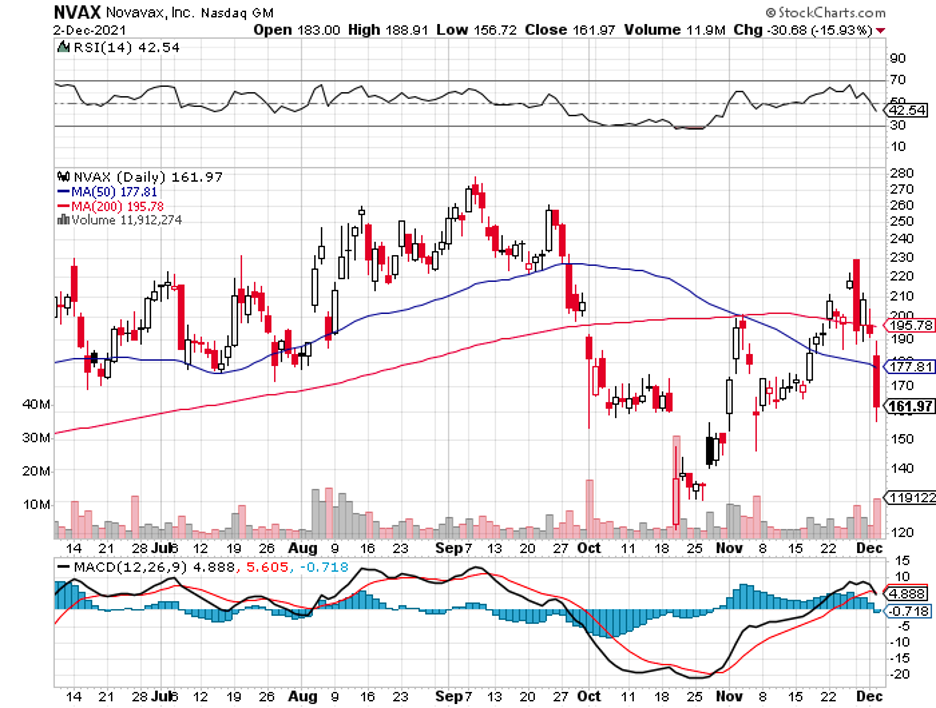Get Ready For the Second Wave of Covid-19 Vaccines
Moderna (MRNA) and Pfizer (PFE) / BioNTech (BNTX) unquestionably rule the COVID-19 vaccine market these days.
These companies have amassed billions in quarterly revenue from their vaccine candidates, with Moderna expecting $18 billion and Pfizer/BioNTech anticipating $36 billion in annual sales this year.
Other than these two, Johnson & Johnson (JNJ) and AstraZeneca (AZN) offer COVID-19 vaccines, but these appear to be distant rivals to the mRNA contenders.
However, it looks like the COVID-19 vaccine market will soon get another competitor—one that has a solid potential to truly carve out a considerable share: Novavax (NVAX).
At this point, Novavax’s vaccine candidate has yet to gain authorization in major markets.
Its shares have also fallen by over 30% since it started in January this year. Nonetheless, the company is projected to turn things around starting this December.
For one, it has already started filing for regulatory approval in various countries and recently gained authorization in Indonesia and the Philippines. Meanwhile, it plans to file for approval in the US before 2021 ends.
To date, Novavax has secured $7 billion worth of advance purchase agreements for its vaccine by 2022.
But a more promising catalyst for Novavax lies in its proven technology.
This makes it notably distinct from Moderna and Pfizer’s vaccines. Simply put, Novavax isn’t offering new technology like the mRNA vaccine.
Rather, Novavax uses a tried and tested approach in the form of protein subunit vaccines. These constitute the very same technology used in vaccines that have been long available in markets, such as the Hepatitis B vaccine.
Considering the pushback in using new technology like mRNA, which comes from healthcare professionals and patients, the entry of a long-established vaccine technology would encourage more people to get the coronavirus jab.
Moreover, Novavax’s candidate can be stored at refrigerator temperatures. This is more convenient compared to the vaccines of Moderna and Pfizer, which require freezer temperatures.
The latest coronavirus variant, Omicron, brings about another catalyst.
Since the WHO announced Omicron’s presence last month, the entire world, including the stock market, has been rattled.
However, this announcement also served to light a fire under COVID-19 vaccine stocks.
After all, every problem can offer an opportunity. Omicron’s emergence has boosted the demand for COVID-19 vaccines.
While it’s never advisable to get the cart ahead of the horse, especially since the worries over the Omicron might be premature, it’s still reasonable to assume that the anxiety triggered by the news will most likely increase the popularity of vaccine stocks.
In the case of Novavax, the company is taking advantage of this exposure to announce that it is currently working on a candidate that’s potent against the new variant.
Beyond Novavax’s COVID-19 vaccine, the company has 8 more programs queued in its pipeline. Of these, 3 are in Phase 2/3 clinical trials.
These include ResVax and RSV F, which are vaccines against the respiratory syncytial virus (RSV). While adults can recover from RSV within weeks, this virus can be fatal to infants and children.
The most promising candidate is NanoFlu, which received a Fast Track Designation from the US FDA in early 2020. It also recorded top-line data against Fluzone from Sanofi (SNY), the leading flu vaccine today.
To give an idea of NanoFlu’s potential, Fluzone raked in $2.9 billion in sales in 2020—and it hasn’t even covered most of the market yet.
Considering NanoFlu’s Phase 3 clinical trials results, the product is estimated to generate more than $9.5 billion in global revenue by 2027.
Admittedly, Novavax investors have experienced a bumpy ride throughout 2021. However, it appears that the biotechnology company is on its way up, thanks to a couple of catalysts that lie ahead.
While I still think that Moderna and Pfizer are great stocks for long-term investments, these companies have already reaped the benefits of share performance. It may very well be Novavax’s turn to impress the market in the next few weeks.

